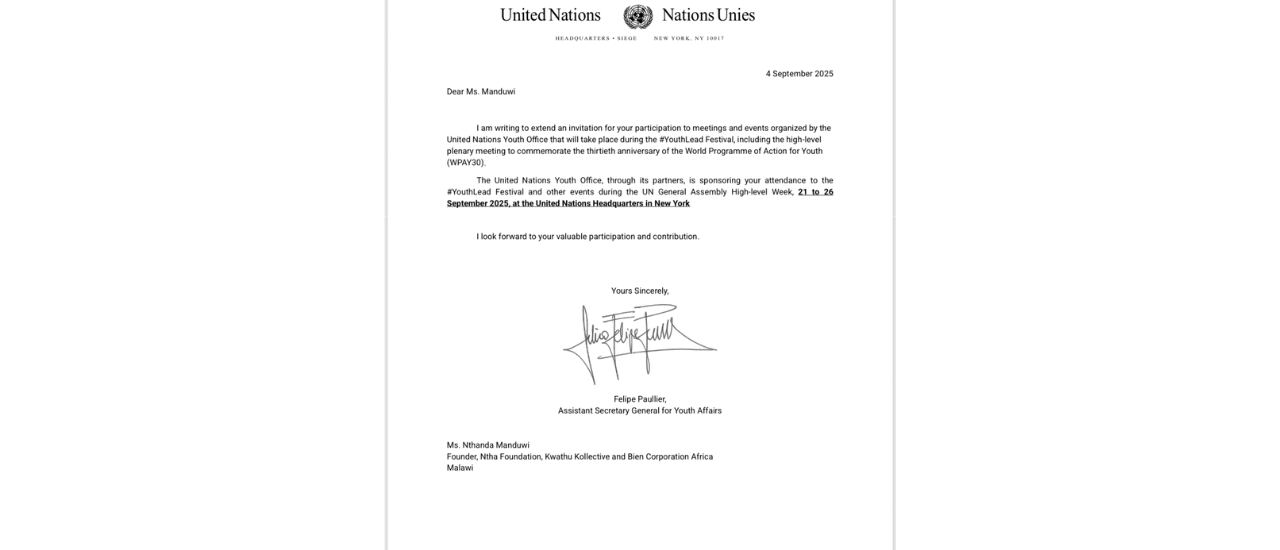


This week, I had the profound honor of participating in the 80th United Nations General Assembly (UNGA80) as an invited guest of the United Nations Youth Office, joining high-level dialogues and commemorations for the 30th anniversary of the World Programme of Action for Youth (WPAY30). It was more than a week of events — it felt like a convergence of everything I care about: youth, innovation, and the future of global systems.
I spoke on AI and the Future of Work during the BBC Africa Town Hall, alongside global leaders including Ahunna Eziakonwa (UNDP Assistant Secretary-General), Dr. ‘Bosun Tijani (Nigeria’s Minister of Communications, Innovation & Digital Economy), and Amal El Fallah Seghrouchni (Morocco’s Minister of Digital Transition).
I shared why Africa must move from being a consumer of AI to a creator of it, why the loss of jobs as we know them could be an opportunity for the continent, and why we must first understand innovation before rushing to regulate it.
I also had the privilege of moderating the Africa Regional Youth Forum on Energy & Just Transition, guiding a powerful discussion with leaders from the World Bank (Mission300), FAO, IRENA, and African innovators. Together, we explored how skills, policy, and investment can empower Africa’s youth to drive an inclusive and innovative energy transition.
Throughout the week, I joined exclusive roundtables with leaders from WIPO, ITU, and ITC, as well as private meetings with UN agencies, African ministers, and development partners. Each conversation reinforced the need for real collaboration, financing for African creators, and strong energy infrastructure to power the continent’s digital future.
A recurring theme for me was this: Africa cannot build its future on outdated colonial systems. Too often, our education models still train administrators rather than innovators; our economic systems expect us to wait for external solutions rather than create our own. Facing these legacies — and deliberately replacing them with creativity and critical thinking — is key to Africa leading in AI and beyond.
This week also marked a personal milestone — sharing my book Feminine Silence with peers and policymakers in New York. To hold space for storytelling during a week usually dominated by heads of state felt quietly radical. It was a reminder that shifting systems also means reclaiming narrative power.
Through my ventures — Bien Corporation Africa, Q2 Corporation, Ntha Foundation, and Kwathu Kollective — I remain committed to helping Africa’s youth not just adapt to the future, but shape it. From AI-driven agriculture and energy solutions to storytelling and digital transformation, our mission is to build platforms that unlock creativity, innovation, and autonomy.
I leave UNGA80 deeply inspired — and more determined than ever to continue building. This generation of Africans cannot afford to wait decades to make an impact. We must innovate boldly, think critically, and claim our place in shaping a just and sustainable future.
At the 80th United Nations General Assembly (UNGA 80), Malawi’s Permanent Representative to the UN, Her Excellency Ambassador Agnes Mary Chimbiri-Molande, delivered a powerful address to the General Debate in New York. Speaking under this year’s theme — “Better Together: 80 Years and More for Peace, Development and Human Rights” — Ambassador Chimbiri-Molande reaffirmed Malawi’s commitment to multilateralism, sustainable development, and a future where African voices shape global policy.
Her statement underscored Malawi’s priorities on peace, security, economic transformation, and the urgent need to empower young people as drivers of innovation and inclusive growth. Watching Malawi’s flag raised in that iconic hall — and hearing our country’s perspective represented on such a stage — is always deeply inspiring. It’s a reminder that even as we critique and push for reform, our presence and participation at the UN matter.
If you’d like to go deeper into my journey — from Malawi, through the United Nations to Microsoft, you can find it in my books: